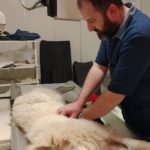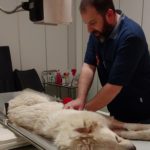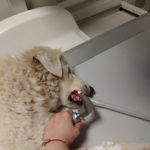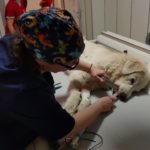The First Aid and Emergency Service offers high specific skills, laboratory and first aid imaging diagnostics together with a high level of experience in the emergency management and stabilization in dogs and cats. The Service is active 24 hours a day for 365 days/year and accepts not only all emergencies, even at night and during the holidays, but also all the first visits (pets) not reported, for triage and sorting to the relevant service. The Emergency Service also deals with monitoring, therapy, assistance and intensive care of patients, hospitalized by the other services of the hospital.
In particular, th Emergency Unit Vets have high knowledge in the rapid identification of the patient’s problems along with a ready decision-making ability, allow them to quickly establish a triage and to manage and stabilize all the main emergencies. The First Aid and Emergency Service, carrying out its activities in close collaboration with the other services of the hospital and therefore having cutting-edge diagnostic support, is able to ensure the transfer of the clinical cases to the competence services for diagnostic and, if necessary, therapeutic aid.
This Service offers a wide variety of diagnostic and therapeutic procedures, in particular, radiology, ultrasound, electrocardiographic and blood pressure monitoring, insertion of thoracic drainage, thoracentesis, basic cytological evaluation of cavitary effusions, analgesia and anaesthesia of the patient in emergency, cardio-thoracic resuscitation, gastric lavage, blood gas analysis, blood smear reading and basic biochemical tests.
The emergencies that are most frequently assessed and treated by the Emergency and Critical Care Unit are:
- Respiratory emergencies (obstruction of the upper airways, tracheal and tracheobronchial obstruction, laryngeal paralysis, tracheal collapse, tracheobronchitis and pneumonia, pulmonary thromboembolism, non-cardiogenic pulmonary oedema, acute lung damage and respiratory distress syndrome, pleural effusion, thoracic trauma, flail-chest);
- Cardiological emergencies (congestive heart failure, pericardial effusion, arterial thromboembolism);
- Shock (hypovolemic, cardiogenic, distributive, hypoxemic, metabolic);
- Neurological emergencies (head trauma, paraparesis/paraplegia, status epilepticus);
- Toxicological emergencies (e.g. poisoning by neurotoxic substances, by dicumarinic, by ingestion of ornamental plants, by ingestion of some foods intended for human consumption, e.g. onion, chocolate, macadamia nuts, dough, xylitol);
- Traumatic emergencies (crash trauma, pneumothorax, traumatic diaphragmatic hernia, bite wounds and lacerations, gunshot wounds, fractures, luxations);
- Acute abdomen (foreign body occlusion, gastric expansion-volvulus, haemoabdomen);
- Environmental emergencies (heat stroke, hypothermia, smoke inhalation, electrocution, drowning);
- Internal medicine emergencies (Addisonian crisis, diabetic ketoacidosis, obstruction of the lower urinary tract, acute renal failure, immune-mediated anaemia and thrombocytopenia, haemorrhagic gastro-enteritis);
- Reproductive emergencies (dystocia, pyometra).
This Unit carries out clinical reference activities for freelance colleagues and praxis from the Abruzzo Region and the neighbouring territories and for owners of small animals as well as support activities to counteract stray dogs through an agreement with the Abruzzo Region to admit dogs and cats wandering around the Region, needing a first aid support. As part of the Veterinary Medicine School, the clinical activity carried out within the Service offers the acquisition of essential knowledge and skills for the professional training of the veterinary surgeon to students from the second/third/fourth/fifth year through periods of clinical rotation. The clinical cases afferent to the Unit represent the fundamental material for applied and clinical research.







